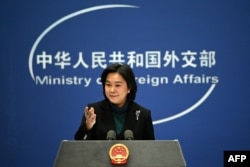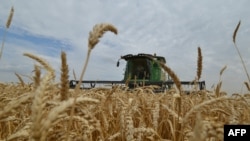China, Russia’s most powerful ally, was notably restrained in its initial reaction to Russia’s invasion of Ukraine, offering little direct support for Moscow as much of the world seeks to isolate Moscow economically and diplomatically.
“I would like to say that China is closely following the situation in Ukraine,” Foreign Ministry spokesperson Hua Chunying told a media briefing on Thursday. “We call on all parties to exercise restraint and prevent the situation from getting out of control.
“We still hope that the parties concerned will not shut the door to peace and engage instead in dialogue and consultation and prevent the situation from further escalating,” she said.
A foreign diplomat based in Beijing said the statement was consistent with China’s recent remarks on the Ukraine crisis but expressed surprise that Hua did not promise Moscow more help against what Western leaders say will be crushing economic sanctions.
“This is more or less what China has been saying last few days,” said the diplomat, who asked not to be identified. “The least one would have expected from Beijing is an assurance that it will go ahead with the recent agreement on purchase of Russia gas.”
Nevertheless, there were signs that China will help to soften the blow of the expected sanctions, some of which have already been announced. The Chinese Customs department released a new order signed on Wednesday for the purchase of Russian wheat.
The two countries had announced a trade deal for the sale of wheat and barley to China on February 8. They appeared to make a point of announcing the transaction even as Russian troops and tanks were rolling into Ukraine.
During the press briefing, the Foreign Ministry spokesperson differed with Western journalists over whether the Russian military action should be called an invasion.
"Regarding the definition of an invasion, I think we should go back to how to view the current situation in Ukraine. The Ukrainian issue has other very complicated historical background that have continued to today. It may not be what everyone wants to see," she said.
Other Chinese experts have echoed the argument made by Russian President Vladimir Putin that Moscow is simply responding to Western aggression and the mistreatment of Russian-speaking populations in Ukraine.
"I believe Russia's military operation is a reaction of Moscow toward Western countries' exerting pressure on Russia for a long time, showing that Moscow can't tolerate anymore," said Yang Jin, an associate research fellow at the Institute of Russian, Eastern European, and Central Asian Studies under the Chinese Academy of Social Sciences. He spoke to the state-run Global Times on Thursday.
Chinese dilemma
There are signs Beijing is caught in a dilemma. It does not want to support or justify the Russian attack on Ukraine because it might harm its political and trade relationship with the Western world.
Beijing is particularly worried about Western experts suggesting the Ukraine invasion could be a test case for China, which has long refused to rule out a military takeover of Taiwan. It does not want the spotlight to focus on China at this stage, informed sources said.
On the other hand, it wants to be seen as a country that stands by its friends and allies, which explains its decision on the wheat purchase. Beijing is expected to offer more trade opportunities to ease economic pressure on Russia but avoid any major political or military measures, the diplomat said.
Putin is believed to have consulted his Chinese counterpart Xi Jinping about the possible fallout of an invasion on Ukraine during a visit to Beijing on February 4. They also discussed possible ways to overcome new challenges that an attack on Ukraine would throw up, sources said.
The same day, Russian state-owned petroleum company Gazprom announced it has signed a 30-year agreement for the sale of natural gas to be supplied to China through a Far Eastern route.
The two countries were prepared for a possible European decision to halt the activation of the Nord Stream 2 pipeline, built to carry Russian gas under the Baltic Sea, directly to Germany.
The United States is particularly worried about a strong partnership between China and Russia.
“We think that Russia and the PRC [want a world order] that is and would be profoundly illiberal, an order that stands in contrast to the system that countries around the world … have built in the last seven decades,” State Department spokesperson Ned Price said Wednesday. “It is an order that is in many ways destructive, rather than additive.”







